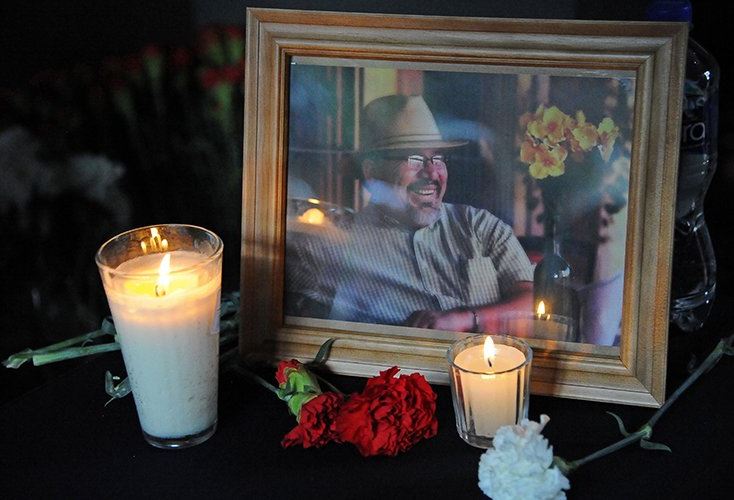Griselda Triana’s husband, fellow Mexican reporter Javier Valdez Cárdenas, was assassinated in May 2017, presumably because of his work covering organised crime and drug-trafficking. This week, Canadian watchdog The Citizen Lab released reports suggesting that Triana was targeted with government-purchased cyber intelligence spyware 11 days after her husband’s death.
According to The Citizen Lab, the Pegasus spyware was manufactured by NSO Group Technologies, a cyber intelligence-focused Israeli tech firm. It enables hackers to monitor content on devices, without the user being aware, through the use of microphones and cameras.

Veldez’ widow Griselda Triana sits alongside writer Eduardo Vázquez Martín at the inauguration of the Javier Veldez memorial.
Image courtesy of Tania Victoria/ Secretaria de Cultura CDMX.
The first batch of malware was sent to Triana’s mobile phone in the form of a link contained within an update from news outlet Proceso, claiming that the attack on her husband had been a carjacking. She received the second cyber infection attempt the following day, in the same format, a suspicious link hidden within a news update text message. Fortunately, Triana did not click on either of the links.
The watchdog reports also mentions that Valdez’ colleagues were targeted by Pegasus spyware the day after his murder. After receiving the news alert in the form of a text message, announcing that the suspects responsible had been arrested, the journalists grew suspicious and decided against opening the message.
Valdez was murdered as he left the offices of Riodoce, in the state of Sinaloa, the newspaper he cofounded in order to carry out investigative journalism focused around the problems in the city of Culiacán. His assassination became a symbol for the country’s news reporting crisis, after at least nine journalists were assassinated last year. Four months into 2019, the death toll is already at five, according to Reporteras Sin Fronteras. Though the majority of cases remain unsolved, the spotlight continues to shine on Valdez’ case.
Describing his murder as an “act of intolerance and censorship of journalistic work,” Valdez’ former colleague Miriam Ramirez spoke to Latin America Reports last year, voicing fears for her own safety, as well as that of other journalists.
“His death has put Riodoce journalists and Sinaloa-based journalists in danger,” she said.
In April 2018, it was revealed that Mexican authorities had arrested a 26-year-old man, alias el Koala on suspicion of Valdez’ murder. Reports by Riodoce suggest the man had links to an illegal drug trafficking group that operated within the area.
Speaking to AP news agency, Triana claimed she was targeted because of her relationship to Valdez. “What reasons were there to spy on me?” she questioned. “Neither I nor my family are criminals, and I am sure that I do not represent any danger to national security.”
According to Citizen Lab research, 25 individuals have been targeted with spyware infections so far this year in Mexico. Those pursued include journalists, politicians, lawyers, international investigators, public health practitioners and anti-corruption activists.
In 2017, Mexican President Enrique Peña Nieto confirmed that his government was a client of NSO Group. Shortly after his inauguration last year, however, current President Andrés Manuel López Obrador vowed to abolish all forms of government espionage.
And given the alarming rates of journalist persecution in Mexico and government involvement in these crimes, the Canadian watchdog’s latest findings continue to highlight serious concerns for the safety and freedom of speech of reporters, their colleagues and their loved ones.
Reporting by Sophie Foggin and Tamara Davison.











